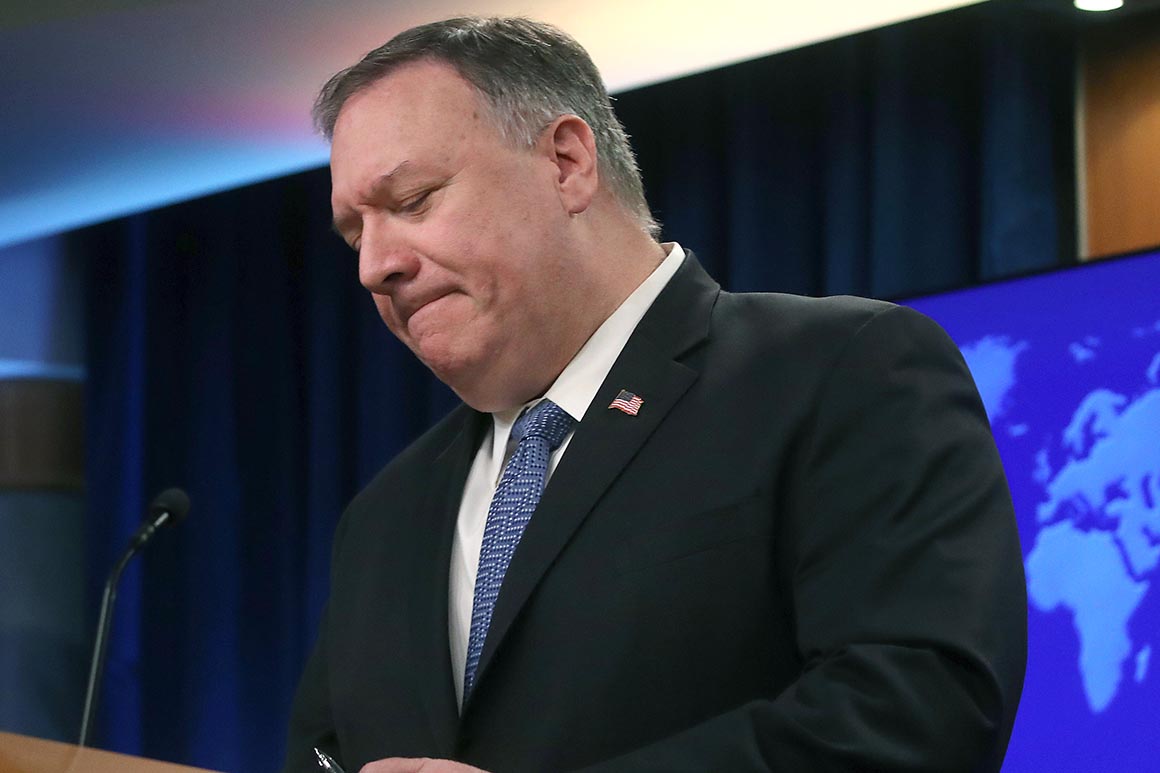
McConnell on Wednesday conceded it’s a “challenging environment” to protect his majority. Republicans are still favored in the Kansas race, but they can’t really afford to put the state on the board, either.
“We still view Kansas as a must-win state. A weak Republican candidate in Kansas is risky and a vote for Schumer as Senate leader,” said Scott Reed, senior political strategist at the U.S. Chamber of Commerce. He said the Chamber’s Political Advocacy Committee plans to meet the week after the filing deadline to discuss its involvement in the race.
“Keeping McConnell as the leader of the Senate is the No. 1 priority for the business community and it looks like it’s going to run through Kansas this time,” Reed said.
If Pompeo sticks with his decision, national Republicans will do whatever they can to deny Kansas’ former secretary of State Kris Kobach the nomination in the Aug. 4 primary. As Sen. John Cornyn (R-Texas) put it: “We need somebody who is electable and that’s a concern.”
Republicans worry Kobach could win the primary and then blow the general election to state Sen. Barbara Bollier, a former Republican recruited by Democrats to run for the Senate seat. Such a scenario isn’t out of the question, although Bollier would have to catch fire and Trump would have to stumble down the stretch.
Kobach insisted that if he wins the primary, the party will get behind him.
“Republicans have an unbroken streak of winning Senate races” in the state, Kobach said, predicting voters would approach it differently than his failed gubernatorial race two years ago. “The political atmosphere in 2020 feels a lot more like 2016 than 2018.”
But Kobach wouldn’t just make national Republicans nervous about the election: They also might find that his hard-line positions on issues such as immigration, make governing difficult. So they are weighing their options.
Party leaders may gravitate toward Rep. Roger Marshall (R-Kan.), a low-key lawmaker who ousted former Rep. Tim Huelskamp, a conservative agitator who frequently fought with House GOP leadership. Self-funding businessman Bob Hamilton and state Senate President Susan Wagle are also in the race.
There’s been a flurry of activity in advance of the filing deadline. Marshall has been running TV ads for weeks. Hamilton, who loaned his campaign $2 million, is on airwaves touting himself as a pro-Trump conservative outsider. The Club for Growth has run ads attacking Marshall, while a pro-Marshall super PAC ran an ad attacking Kobach and the Club. Reed, meanwhile, said the Chamber has been “impressed” with Marshall, whom they’ve supported previously.
Marshall’s campaign released internal polling Wednesday showing him narrowly leading the field and up double digits in a matchup with Kobach. Marshall said he took Pompeo at his word that he was staying out of the race and declined to say what he’d do if Pompeo surprised everyone and jumped in.
“We will beat Kris Kobach one-on-one, we’ll beat him in a crowded field,” Marshall said in an interview. “Either way, we have clearly separated ourselves from everybody else and we’re best positioned to keep a Republican majority.”
Still, some Republicans are concerned about Marshall as their standard-bearer. He raised $376,000 in the first quarter this year, a low total for a House incumbent, let alone a Senate candidate. One Kansas Republican said there’s a “soft coalescing” around Marshall but that he hasn’t inspired much support.
Marshall brushed off those concerns, pointing to the coronavirus outbreak to explain away the modest fundraising. He said the fundraising would “take care of itself” and pointed to his advantage with money in the bank.
Bollier, the Democratic candidate, outraised the GOP field in the first quarter of this year and launched her first TV ads this week.
There are two schools of thought on how the race could go without Pompeo. In the rosy scenario for Republicans, the GOP would unite around the nominee and ride Trump’s coattails to victory a la 2016. Trump won the state by 20 points four years ago and Kansas hasn’t elected a Democratic senator since 1932.
“It’s likely the Republican wins whoever our nominee is. And I think President Trump will carry [the state] by a good margin and I can’t imagine that Kansans would split that ballot. So I remain optimistic,” said Sen. Jerry Moran (R-Kan.), who won reelection by 30 points in 2016.
Kobach insists this is how it would play out if he emerges as the nominee, though he is prepared to face three months of attacks from Republican groups trying to derail his candidacy. He said in an interview that he remains on good terms with Trump, and that he spoke with the president by phone Tuesday, though he declined to discuss the specifics of the conversation.
The Democrats’ favored scenario — and the one Republicans fear — would be an echo of 2018, when Kobach narrowly beat an incumbent GOP governor in the primary and then lost the general election to Laura Kelly, a Democrat. Democrats also gave retiring Sen. Pat Roberts a scare in 2014 by subtly supporting Independent Greg Orman’s bid, though he ultimately lost by 10 points.
Though Kansas has a history of electing Democratic governors, Republicans think a Democratic senator would be a bridge too far to the state’s conservative voters.
Jesse Hunt, a spokesman for the NRSC, downplayed concerns and said in a statement there “isn’t enough liberal out-of-state money in the country to convince Kansas voters to elect” Bollier.
“It’s a presidential year and Kansas is so red,” added Sen. Josh Hawley (R-Mo.), who hails from the Kansas City area. “It would be a little different if it were an off year and Trump weren’t on the ballot. But I just feel like it’s going to a strong gravitational pull.”
Source: politico.com
See more here: news365.stream






